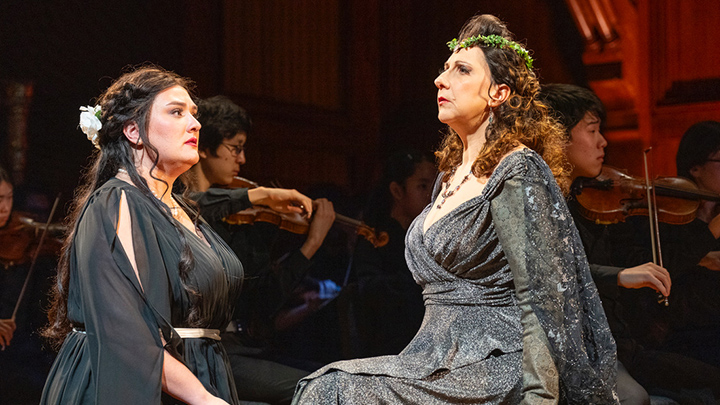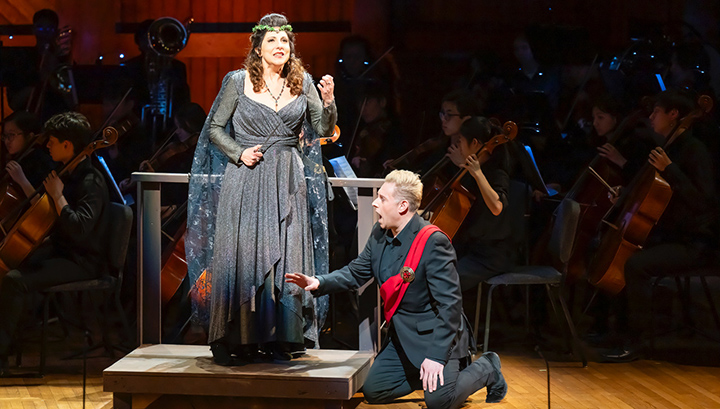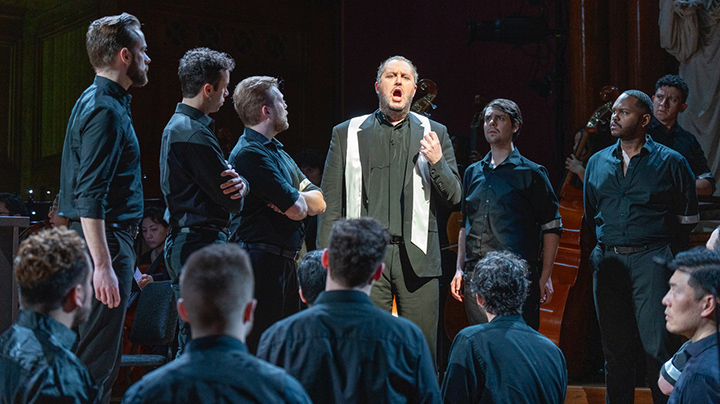Yet don’t let the average age of the instrumentalists (which I’d pin somewhere around 15) lead you to believe that the playing would be inferior – indeed, the seats of Harvard’s creaky and claustrophobic Sanders Theater were packed on Sunday for a performance of Bellini’s Norma that had genuine spark. Played by over 100 prodigious students from the Boston metropolitan area under the guidance of BYSO’s Music Director and Conductor Federico Cortese and with a cast of professional singers, the afternoon did much to pump some heat into a frigid New England winter.
On the orchestral front, this semi-staged performance prioritized cohesion and a broad-strokes take on the score. Across two ensembles (different orchestras played the two acts), Cortese kept the tempi brisk and regular; the orchestra was keenly responsive to his direction and the overture, with all its bombast, showed some especially lovely dynamic shading. Elsewhere, individual sections showed polish – the low brass displayed some a gallic gloom and the strings were especially sonorous in the Act II overture. And if the orchestra sometimes covered the singers when playing full-out, it was certainly no worse than any average night Yannick Nézet-Séguin conducts at the Met. The banda, positioned alternately right next to where I sat and just outside the hall for effect, was punchy (my ears are still ringing), and the BYSO Chorus (directed by Charles F. Prestinari) sang with real bite and clear enunciation.
The forces coalesced graciously in order to give Lucchese soprano Serena Farnocchia an occasion to make her role debut as Norma. Farnocchia’s career seems to have stalled since the pandemic–Operabase shows that her last staged performances were as Aida in Tokyo last April—which is unfortunate because Sunday’s performance showed that this artist in her prime has quite a lot to give.
Farnocchia is an old-fashioned Italian soprano in two senses: on one hand, her limpid, glistening base timbre is complemented by a vibrant textual alertness—she has the accento thing down pat—and on the other hand, at least in the case of her inaugural Norma, she seems to be overflowing with ideas about the character; ideas, though, that often go beyond the limits of what the voice is consistently able to support.
This was most obvious in the colorings she chose; while Norma’s more earnest or imperious public-facing moments drew upon her natural timbre possessed of evenness, flexibility, and bronzed high notes (as in “Casta diva,” built of rather short phrases beguilingly stitched together—only at her register break was there some slight raggedness). Elsewhere, she sweetened her tone considerably, drawing her placement forward and slackening a steady vibrato to reflect fondly on her love for Pollione (“O! Rimembranza!”). And in moments of vehemence (“Oh! Non tremare!), the sound became darker and more constrained. Anguish (“Teneri figli”) got its own timbral treatment, pinched and pushed.
Insofar as dramatic coherence, it was an intelligent move; many Normas would be lucky to have so many shades to conjure up and the smarts to put them in order. But the voice didn’t respond consistently in each mode—high notes were unpredictable in their quality across scenes and her coloratura agility often felt needlessly compromised. Some of this can likely be smoothed out as she gains comfort with the role and even these problems were consistently preferable to a one-note take on the role. I only hope Farnocchia’s performance schedule picks up to give her further opportunities.
Ashley Dixon, a bona fide mezzo with the low notes to prove it also making a role debut, proved a wonderful partner. Hers is a sound with both depth and range (her high notes were often more secure than Norma’s, though the center of her range would have benefitted from more heft against Cortese’s orchestra). She was also consistently at Farnocchia’s native level with enunciating the text; the solitary, Petrarchan echoes of “Sgombra è la sacra selva” resonated with clarity and her pianissimo singing was gentle but firm-footed. In both of the Norma/Adalgisa duets, caught between staying faithful to her friend and following her lover, her mellow sound blended with Farnocchia’s brightness. She will sing the role again in Palm Beach Opera’s production in the spring (opposite Jessica Pratt, yet another Norma debutante); Florida residents would be wise to seek out a performance.
But if the Norma and Adalgisa were worthy of each other, unfortunately the Pollione wasn’t up to their standards. Dominick Chenes was in even bleatier form in the higher tessitura of Pollione than he was as Pinkerton in Boston Lyric Opera’s Madama Butterfly last year. His tight vibrato and wooden stage presence are an awkward combination and when he reached for the Cs of “Meco all’altar di venere,” the texture from the sound vanished altogether into white, croaky yelps. He improved somewhat throughout the performance with the leisurely rhythms and pleading lines of “Vieni in Roma” fitting especially comfortably onto his voice as he begged Adalgisa to run away with him and drummed up some genuine ardency in the final scene, but no amount of squillo could make up for his lack of spontaneity with the music. In fact, from the very first scene, I found myself more interested in the intriguingly bloomy sound of Neal Ferreira as Pollione’s friend Flavio than in Pollione himself.
Oroveso was the bracing Turkish bass Önay Köse who firm sense of line and penetrating sound were deployed with increasing elegance throughout the performance, his declamation never becoming barky or gruff. And as Norma’s mother’s helper Clotilde, Sarah Joyce Cooper sang with an attractive, covered sound. The entire cast benefitted from the uncomplicated traffic direction of Joshua Major, though the white stoles with which Brooke Stanton decked out the Druids were somehow the most high school choir aspect of a performance that was majority actual high schoolers. It was a strong concert opera start to a week that will see the Boston Symphony Orchestra take on Shostakovich’s Lady Macbeth of Mtsensk this Thursday and Saturday ahead of their Monday appearance at Carnegie Hall.
Photos: Michael J. Lutch






